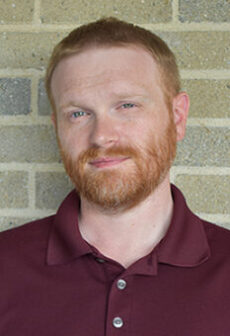Advent: reflect in joy and anticipation

Shawn Reeves
By Shawn Reeves
Second Sunday of Advent/Dec. 8
Isaiah 11:1-10; Psalm 72:1-2,7-8,12-13,17; Romans 15:4-9; Matthew 3:1-12
The practice of balance is often associated with Eastern mysticism. The principle of the body and mind poised in disciplined equilibrium pervades our culture’s impression of an Eastern approach to life, tethered to images of meditating Buddhist monks and resolute masters of martial arts. However, our own Catholic tradition’s emphasis on temperance is equally a directive toward balance, “balance in the use of created goods.”
Temperance is the domain of moral balance, the harmonizing fulcrum between two extremes. Tip too far in either direction, and you have lost the balance of temperance and fallen into vice. Temperance orders goods and holds them in proper tension.
Advent is the season in which the Church reflects upon itself as a work in progress, a mystery in progress, where hearts are exhorted to hold in balance the joy of what God has already done and the anticipation of what He has yet to do.
In our Gospel, John the Baptist emerges from the desert of Judea clothed in the resemblance of Elijah and dining on locusts and wild honey. His garb is the simple humility of a prophet, and his food is that of a pilgrim, relying on what God supplies in the immediacy of the present moment. And everything about him is a juxtaposition. All come to hear his message and be baptized, yet he directs them to another, “one coming after me” who is mightier. John baptized “with water for repentance,” yet this “mightier” one will baptize “with the Holy Spirit and fire.” And “the Kingdom of heaven is at hand,” yet a path must still be made straight, a way must still be prepared for the coming of the Lord.
John the Baptist presents himself as the meeting point between two epochs, two eras of grace balanced against one another — one of the grace of preparation and the other of fulfillment, the drama of anticipation and the spectacle of arrival (adventus in Latin). The “shoot . . . from the stump of Jesse” has appeared, the one on whom “the Spirit of the Lord shall rest” is near. Jesus Christ will soon arrive to “confirm the promises to the patriarchs” and dispense the gifts of this same Spirit.
A WORK IN PROGRESS
In a masterful balance, the spirituality of St. John the Baptist is that of understanding himself to be at once a citizen of a kingdom already “at hand” while also a pilgrim journeying toward its final expression. As such, St. John the Baptist stands as an icon of the Church, which exists as both Kingdom and Pilgrim.
The Second Vatican Council affirmed that the Church exists as “the kingdom of Christ already present in mystery” while also conceding its status as a “pilgrim Church” composed of members “on their earthly pilgrimage” toward the glory of heaven. Like John the Baptist, a pilgrim makes preparations, selecting the apparel most appropriate for the task. Like John the Baptist, a pilgrim welcomes whatever goods present themselves to sustain one on the journey, whether it be the spontaneous food of locusts and wild honey or the nourishment of a daily Mass. A pilgrim ruminates on the delights of their goal, be it “the promises to the patriarchs” or “the encouragement of the Scriptures.” A pilgrim perseveres in the journey, fully accepting every moment with a strident determination that is always balanced with a steadfast and hopeful vision of the destination, for hope is the enterprise of patient endurance, the expectation of promises fulfilled.
A dear friend would often say, “Don’t be afraid to be a work in progress.” Advent is the season in which the Church reflects upon itself as a work in progress, a mystery in progress, where hearts are exhorted to hold in balance the joy of what God has already done and the anticipation of what He has yet to do. In Advent, the Church realizes more clearly its status as a wayfarer, a community progressing in pilgrimage toward the Kingdom of Heaven already begun in the birth of Christ but awaiting its completion in His second coming.
Perhaps more than any other liturgical season, Advent possesses the character of temperate balance, the delicate tension of endurance and encouragement. But as St. Paul declared in our second reading, our God is “the God of endurance and encouragement,” supplying the graces we need for strength on our pilgrimage, encouraged by the promises of heavenly glory.
—
SHAWN REEVES has served as the director of religious education at St. John’s Catholic Newman Center in Champaign since 2001. He and his family attend St. Elizabeth of Hungary Church in Thomasboro.





